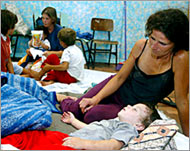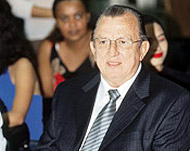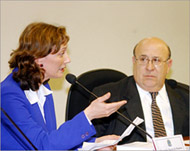Brazil’s child sex abusers feel the heat
More than 250 members of the Brazilian elite – politicians, judges, priests and businessmen among others – have been put on notice by an extraordinary national investigation into child sex rings.

The inquiry accuses 20 serving politicians, including a federal deputy, two state deputies and three city mayors. Thirty businessmen are implicated, as are five priests.
“Sexual exploitation in Brazil is a crime which has reached epidemic proportions,” says federal deputy Maria do Rosario, the author of the parliamentary inquiry report.
In one of the report’s testimonies, Evelyn* told how the children would be recruited by teenagers and counted as “heads” like cattle.
“I was one of the people that took them there, because I made money,” she said.
“Let’s suppose you have five beautiful girl friends, all young. I take them there and when I get there I get money. For each ‘head’ I got R$50 ($17). There was one woman who always took a lot of young girls there. One time, she made R$500 ($170), just on girls. She called two taxis and took them to the club.”
That child sex abuse in Brazil is well-organised and enjoys high-level protection is demonstrated by the shocking story of the Big Bus.
Elaborate scheme
The vehicle travelled around the dusty roads of the Brazilian northeast but it never displayed its destination. The only people it stopped to pick up were businessmen and children.
 |
|
Over 44 million out of 175 million |
Cesar Tadeu Teixeira and Fabio Pereira dos Santos were two businessmen who allegedly ran the bus. It was specially adapted with two benches, a double bed and a comfortable sofa.
“They filled the bus with the girls and drove to a fazenda (farm), which is where the abuse happened,” says Fernando.
“There was one time that they went to Porto Velho [a city near the Amazon] in the Big Bus and at the police checkpoint they were given the signal to stop. But Cesar told the driver just to carry straight on.
“So the police chased behind in patrol cars with rifles and circled the bus until he stopped 15km away. Cesar used his influence and called someone in Rio Branco [the capital of the neighbouring state] – I don’t know who it was – and this person of authority spoke to the military police and the police freed the bus, full of young girls,” he said.
“Although the bus was well known to many people in the city and the clubs paid to use it for child sex abuse, it was never seized and afterwards was destroyed by its owners,” said Fernando.
Who’s Who
Fernando has given testimony to the parliamentary inquiry. The businessmen behind the Big Bus are just two of a jaw-dropping list of politicians, judges, priests and fellow business leaders after the year-long investigation.
“Sexual exploitation Maria do Rosario, |
The cases will now go forward for federal and state criminal investigations after an affirmative vote in the Brazilian Congress on 13 July.
The report, Comissao Parlamentar Mista de Inquerito da Exploracao Sexual, is the result of a countrywide investigation by 11 senators and 11 deputies cutting across party lines and the result of testimonies from 22 of Brazil’s 27 states.
“The investigators collected more than 800 testimonies.
“It’s just that I want to tell you the truth: this thing of minors, everyone knows that it’s the minors, right?” asks 17-year-old Helena, a prostitute since she was 13.
“Mainly the clients, these society people, politicians … And doing a trick because these are good people, you know, this is what they want, the minors, the new ones, the beautiful ones. And they aren’t here, no, for emotional reasons.
“It was humiliating. When I tried to go out, I felt dirty, my body and my soul. I’ve already tried suicide because I can’t stand it any longer,” she says.
The United Nations estimates that there could be as many as 500,000 child victims of sexual abuse in Brazil.
Legal loopholes
For those rapists acting with impunity, there have been three traditional ways of getting away with it – friends, corrupt politicians and the archaic law.
Witness the extraordinary case of the current mayor of Goias, Boadyr Veloso, who was sentenced to 13 years in prison for raping seven girls, one as young as 11.
 |
|
Mayor Veloso, a free man, was |
Yet he remains a free man thanks to legislation dating back to the 1940s. Under Brazilian law, if a rape victim subsequently gets married, then the process is annulled if she never brings charges.
Veloso had simply organised for all of the girls to get married and gave them money, say the accusers.
All the victims were from a favela in the city. A gynaecologist before entering politics, Veloso, now 66, bought the girls’ virginity for around R$100 [$33] each, it is alleged.
One victim told the Brazilian magazine Epoca, which worked with the parliamentary investigators: “It was him that took my virginity. I was 11 years old. People called him uncle. I was just a child. I felt dirty. I did it only for the money.
“At the time in the motel I said that I wanted to leave but he said I had to do it with him. If not, I don’t get money. I bought clothes. We had sex many times. I couldn’t say anything, could I? I was afraid.”
There will be another criminal process as the public ministry tries to annul the weddings they say are “fraudulent”, but meanwhile Veloso is standing for re-election in November.
Poverty connection
The Amazonian city of Manaus is labelled the epicentre of child trafficking for prostitution. But after a bitter battle in Congress, the most high-profile political name on the inquiry’s list, the vice-governor of Amazonas, Omar Aziz, was taken off at the last minute.
 |
|
Report author Do Rosario (L) was |
Federal deputy Maria do Rosario, who had already warned that she was under strong pressure to remove names, said: “Who voted against, believed in the accused. I believe in the victim.”
Brazil has huge levels of wealth inequality, and unemployment is as high as 20% in states such as Sao Paulo. More than 44 million people of a population of 175 million don’t have enough food, according to government figures.
“It is clear that in certain areas, sexual exploitation is connected with poverty,” says Senator Patricia Saboya, who is the president of the parliamentary inquiry.
One witness said: “I’ve seen girls prostitute themselves for a plate of food or for R$1.99 (66 cents). A girl told me: ‘At the end of the day, who doesn’t want a bag, clothes or a chic pair of shoes?’ to justify her prostitution.
“I asked one: ‘Why are you not going to study?’ And she said: ‘Ah, now I can eat as many cheeseburgers as I want.’ This has stuck with me until today, because have you even thought that someone would prostitute themselves because they want to eat a cheeseburger? God knows what the story of these cheeseburgers is going to play in her life,” the witness said.
Archaic laws
Another important point, according to Senator Saboya, “is that a lot of religious leaders, of the Catholic church, Evangelical and Afro-Brazilian religions, are using their power in the community to sexually exploit children”.
One of the accused is the evangelical pastor Davi Moreira Filho of the God and Love Church in Sao Paulo.
|
“The real aim of this inquiry is to part the waters in the way we think about the issue of protection of children and teenagers in Brazil” |
The inquiry has also called for an overhaul of Brazil’s archaic laws. One demand is to raise many cases that are categorised as “offences against public morals” to “sexual crimes”.
Currently there is no law on rape against boys. Also, trafficking of adolescents for sexual abuse is only a crime across international borders and not within Brazil itself.
“The real aim of this inquiry,” says Saboya, “is to part the waters in the way we think about the issue of protection of children and teenagers in Brazil.”
And to never see a Big Bus again.
*The names of some people have been changed to protect confidentiality